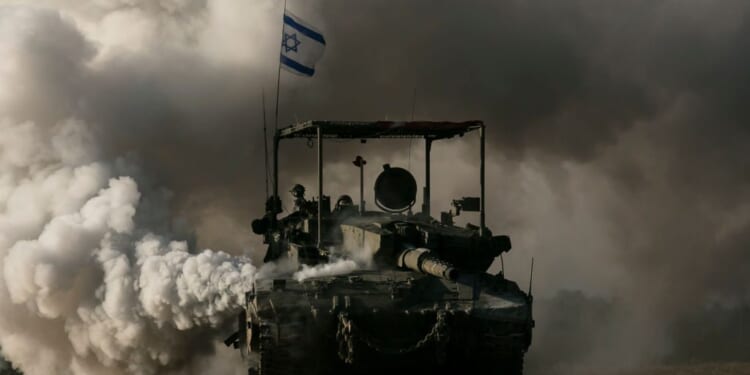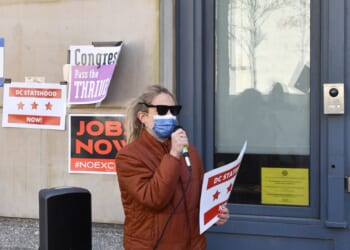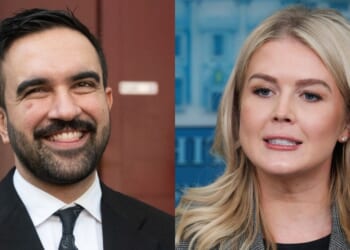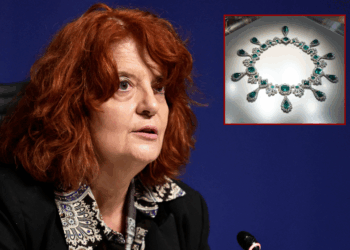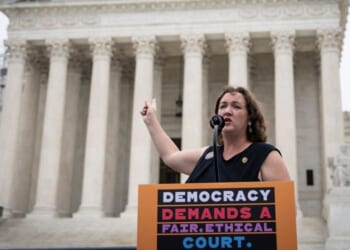I recently caught up with an old Israeli friend who’s been living for decades in the United States. We last saw each other in the early months of 1973, when we were undergoing basic training as raw recruits into the Israel Defense Forces (IDF). We trained as combat infantry, and put that to use in the Yom Kippur War and the fighting that followed. But for much of our service, we either patrolled the borders or enforced the occupation. As my friend related, during one of those operations in the West Bank, his squad broke into a Palestinian home and he accidentally stepped on a small child. He doesn’t know what happened to the child — but, as he explained to me, he never quite recovered from the incident, which partly explains why he ultimately left Israel for a new life abroad.
I know of many other, no less traumatising, events. In 1987, I published a Hebrew-language novel called Border Patrol — based on a case I had heard at the time — about a soldier who accidentally kills a pregnant woman in Lebanon, and is haunted by the ghost of the unborn child. Then there were such cases as the 1982 massacre of Palestinians in the refugee camps of Sabra and Shatila, carried out by Lebanese Christian militias supplied and supported by the IDF, with Israeli troops surrounding the camps and lighting up the area with flares. From wars to skirmishes to endless occupation, serving in the IDF has provided ample opportunities for violence, accidental or otherwise, against innocent civilians.
All the same, as I think back to my basic training, shortly before the hell of the Yom Kippur War, I must admit that we were taught to respect and fear the weapons we were given. The “purity of arms” of the IDF was always partly mythical — yet it was constantly drilled into us. To be victorious, we were told, we had to be just, and as soldiers we were issued clear instructions on when we were allowed to open fire: rules which were strictly enforced. The IDF could not be like those marauding, lawless, criminal armies that subjected Jews to wanton murder, rape, and humiliation during the long centuries of exile. As early as the Thirties, the prominent Zionist leader Berl Katznelson exhorted Jewish paramilitary troops in Palestine: “May our arms remain pure. We train to use weapons, we carry weapons and confront those who attack us. But we do not want our arms to be soiled by the blood of innocents.”
In reality, of course, since its formation in 1948, the IDF engaged in multiple war crimes, not least during the War of Independence itself. Most of these crimes were covered up or denied, from the now well-documented cases of executions in Palestinian villages in the Galilee, which were long denied, to the widely reported massacre of over 100 people, including women and children, in the village of Deir Yassin in April 1948, for which no one was eventually charged.
Even so, on occasion, a few have been prosecuted and held up as a warning about the potential of young armed men descending into savagery. This was the case of the massacre of over 40 civilians in Kafr Qasim in 1956, which resulted in an Israeli court ruling that a “black flag” flies over unlawful orders to kill innocents. But the occupation, which began following the Six Day War, brought with it growing dehumanisation of the Palestinians and the ever-progressive loosening of rules on exercising violence against civilians, as can be seen now in the escalating attacks by Jewish settlers, often abetted by IDF troops, against Palestinians in the West Bank. The scandal that is currently roiling Israeli society — and the nature of the debate surrounding it — is the culmination of this process, with profound ramifications for the rule of law in Israel as a whole.
In July 2024, the IDF military police opened an investigation into reports of abuse of Palestinian prisoners in the notorious detention centre of Sde Teiman. An initial attempt to arrest some of the suspected soldiers was met with demonstrations, and some protestors and far-Right politicians broke into the camp to protect the culprits. Eventually, five soldiers were indicted for causing severe abuse and injury to a prisoner who had to undergo emergency surgery. As protests reached a frenzy, a clip allegedly showing soldiers brutalising a prisoner was leaked to the media, exposing to the public the severity of the abuse. Initially, the office of the Military Advocate General, tasked with running the investigation, insisted that it could not determine the identity of the leaker. But, in October this year, Military Advocate General Yifat Tomer-Yerushalmi resigned, conceding that she had authorised the leak to protect her office from false accusations that it was needlessly persecuting innocent soldiers merely carrying out their duty against Hamas operatives. She then disappeared, raising fears about her possible suicide. Fortunately, Tomer-Yerushalmi later resurfaced, only to be taken into custody herself. She is currently under investigation both for leaking the video and for lying to the Supreme Court about its provenance.
Israeli society is starkly divided over the scandal. Those who defend the arrested soldiers — notably Minister of National Security Itamar Ben-Gvir — claim that Tomer-Yerushalmi and her office are part of a “deep state” plot: one that is trying to undermine the Israeli government, “tie the hands” of the IDF in its war against terrorism, and prevent it from accomplishing a “final victory” against Hamas. Those who defend Tomer-Yerushalmi say that while she might have made mistakes in how she conducted herself, what matters much more is that she and her office stood up for the rule of law and exposed the abuse of Palestinian prisoners by rogue IDF soldiers.
The truth is far more sordid — and troubling. The office of the Military Advocate General is charged with investigating and charging illegal conduct by members of the IDF. Yet for the past two years, as the IDF killed tens of thousands of civilians in Gaza, and as evidence mounted of attacks against aid workers — from a drone strike against the Aid Central Kitchen charity in April 2024, to the tank shells that killed 22 at a hospital in August 2025 — Tomer-Yerushalmi, the IDF’s top legal adviser, did virtually nothing.
This did not begin on October 7. For years, the office of the Military Advocate General has facilitated and obscured the crimes of Israeli soldiers. Created in 1948 to provide judicial advice, and to arrange military trials, the office is headed by an advocate general appointed by the Minister of Defense and is not directly subordinate to the army’s chief of staff. It also includes a department responsible for ensuring that the IDF operates in accordance with international law.
As a 2016 report by the Israeli human rights organisation B’Tselem pointed out, however, this entire military judicial apparatus gradually transformed into a mechanism for covering up crimes, what it called a “fig leaf of the occupation”. Indeed, after years of failed appeals to the military justice system, B’Tselem concluded that the Advocate General’s very existence was intended not to deliver justice — but to offer its semblance.
“The Advocate General’s very existence was intended not to deliver justice — but to offer its semblance.”
This conclusion is supported elsewhere too. As far back as January 2009, for instance, Haaretz reported that the office adopted highly controversial interpretations of international law to justify the IDF’s actions in Gaza during Operation Cast Lead. That included the bombing of a graduation ceremony of a police course on the first day of the operation that killed dozens of policemen, and the killing of 40 people by a mortar shell aimed at a target next to a United Nations Relief and Works Agency school, where Palestinians were sheltering. “Our goal is not to fetter the army,” Daniel Reisner, the officer who established the department was even quoted as saying, “but to give it the tools to win in a lawful manner.” More than that, Reisner explained that his department backed policies that were “on the edge” of the legal void: demolishing houses, carrying out deportation, and conducting targeted assassinations. “What we are seeing now is a revision of international law,” Reisner added, a decade and a half before October 7. “If you do something long enough, the world will accept it.”
According to B’Tselem, Operation Cast Lead caused the death of 762 innocent civilians, including 318 children and over 100 women. But officials in the legal department insisted that these deaths, along with a great deal of indiscriminate destruction of property, had no impact on the legality of the operation. “The law has actually been stood on its head,” concluded Professor Orna Ben-Naftali, an Israeli legal scholar, even back then. “It has ceased to fulfil its purpose, and we have to admit that it has gone into dissolution procedures ahead of bankruptcy.”
The slippery slope of 2008 became even more pronounced during the IDF’s 2014 Operation Protective Edge, in which over 500 Palestinian children were killed. The plunge to the abyss, as is well known, came with Israel’s response to the October 7 massacre. Over the next two years, at least 68,000 Palestinians were killed, of whom up to 20,000 were children. As far as is known, no one has been brought to account. Indeed, the Advocate General’s office provided legal licence for much of the killing. For one thing, it showed a high tolerance of civilian collateral damage in attacks on Hamas operatives — not only senior officers but low-ranking members too — by asserting that civilians who would or could not leave their homes as instructed could be considered enemy targets. For another, it refused to undertake all but the most superficial investigations of blatant crimes, adding to the sense of impunity among IDF troops.
Given all this, it is anyway difficult to feel sorry for Tomer-Yerushalmi, even if one must regret that she will pay a price for the wrong crime. What is more troubling, though, is that Prime Minister Netanyahu and his minions have pounced on the case as an opportunity to accelerate their campaign of dismantling what remains of Israeli law, installing their own people in positions of power and claiming that any accusations of wrongdoing are mere manifestations of “deep state” liberalism and foreign antisemitism. Most recently, the government has announced that it would launch its own inquiry into the fiasco of October 7 — which occurred under its watch — rather than establishing an independent state commission of inquiry.
All the while, one must wonder who now is left to stand in the breach? As I recall how all this began, with the progressive cheapening of Palestinian lives and the use of law to justify the unjustifiable, I can only conclude that, when some of us youngsters warned of the corrupting effects of the occupation in the years following the war of 1967, we had no idea how far Israeli democracy would finally be dismantled. Thanks to a military justice system that provides impunity to the IDF, the horror I described four decades ago in Border Patrol has now become the norm.

